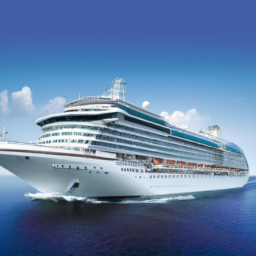5 Common Cruise Scams And How To Avoid Them
So you’ve finally decided to embark on a well-deserved cruise vacation, but before you set sail, it’s crucial to arm yourself with knowledge about the unfortunate reality of cruise scams. In this article, we’ll take a closer look at five common cruise scams that unsuspecting travelers may fall victim to, and more importantly, we’ll equip you with the necessary tips and tricks to steer clear of these deceitful schemes. From dubious excursion packages to fraudulent ticket sellers, we’ve got you covered with essential information to ensure you have a worry-free and scam-free cruise experience.

Booking Scams
When it comes to booking your dream cruise vacation, it’s important to be aware of the potential scams that lurk in the digital world. One common scam involves fake cruise websites that mimic legitimate ones, tricking unsuspecting travelers into making bookings and payments. These websites often offer enticing deals and discounts that seem too good to be true, and unfortunately, they usually are. To avoid falling victim to this scam, always double-check the website’s URL and make sure it is secure (look for the padlock symbol in the address bar) before entering any personal or payment information.
Another booking scam to watch out for involves unreliable travel agents. While most travel agents are reputable and work diligently to provide you with the best travel options, there are some who may engage in deceptive practices. Always research the travel agency and read reviews from other customers before making any bookings. If something feels off or the agent pressures you into making a hasty decision, it’s best to walk away and find a more trustworthy agent.
Phishing emails are another method scammers use to target unsuspecting travelers. These emails often appear to be from legitimate cruise lines or travel agencies, requesting personal information or urging you to click on suspicious links. To avoid falling for this scam, never click on links or download attachments in emails that you are not expecting, and be cautious of emails that ask for personal information. Legitimate companies will never ask for sensitive information via email.
Hidden Charges
While booking your cruise, it’s crucial to be aware of the potential hidden charges that can quickly inflate the cost of your vacation. One common hidden charge is gratuities and service charges. While it’s customary to tip the staff on a cruise, some cruise lines automatically add a daily gratuity charge to your bill. Make sure to read the fine print and understand the tipping policy of the cruise line you choose.
Additionally, onboard spas and specialty dining can come with additional fees. These indulgences may seem tempting, but it’s essential to budget for these charges to avoid any unexpected surprises when you receive your final bill.
Lastly, port fees and taxes are often added to the cost of your cruise. These fees can vary depending on the ports of call and are typically not included in the initial price you see when booking. Make sure to inquire about these fees upfront and factor them into your budget before making a final decision on your cruise.
Fake Excursions
One of the highlights of any cruise is the opportunity to explore exciting destinations through shore excursions. However, it’s vital to be cautious of fake excursion scams that can put a damper on your experience. One common scam involves unlicensed or unauthorized operators. These operators may offer tours at a discounted rate but often lack the necessary permits or insurance. By booking with them, you risk your safety and potentially missing out on the highlights of your destination.
Another red flag is overpriced or poorly organized tours. Scammers may advertise seemingly amazing excursions that promise exclusive experiences but fail to deliver. Research the tour provider in advance, read reviews from other travelers, and compare prices to ensure you are getting a fair deal.
Lastly, be wary of inflated ratings and reviews. Some tour operators may manipulate online reviews to boost their reputation or create fake testimonials. It’s always wise to explore multiple sources of feedback and rely on reputable travel websites and forums for honest reviews and recommendations.
Identity Theft
Protecting your personal information is essential in today’s digital age, and this holds true even when you’re on a cruise vacation. There are several ways scammers can target your identity, and it’s crucial to stay vigilant and take appropriate precautions.
Public Wi-Fi networks are convenient, but they can also be a hotbed for online scams. Avoid connecting to public Wi-Fi networks, especially if they are not password-protected. Scammers can easily intercept your data and gain access to your personal information. If you need to connect to the internet while on a cruise, it’s advisable to use a trusted virtual private network (VPN) to secure your connection.
Another common risk is lost or stolen documents. Your passport and other identification documents are crucial for any international travel, and losing them can be a nightmare. Always keep your documents secure in a locked safe in your cabin and be cautious when carrying them ashore. It’s also a good idea to make copies of your documents and keep them in a separate location in case of emergencies.
Credit card fraud is another risk to be aware of. Scammers may attempt to steal your credit card information through various means, including placing skimmers on onboard ATMs or using phishing techniques to trick you into providing your card details. Always keep a close eye on your credit card statements and report any suspicious charges immediately. Consider using a secure payment method, such as a pre-paid travel card, to minimize the risk of fraud.

Fake Charity Scams
Cruises often present opportunities to give back to the communities visited or support charitable organizations. However, it’s crucial to be cautious of onboard solicitations and potential fake charity scams.
Onboard solicitations, often in the form of raffles or auctions, may claim to support a charitable organization or a cause. While some of these fundraisers are legitimate, others may be questionable. Before donating any money or participating in these activities, research the organization and ensure they have a reputable track record. It’s also advisable to donate directly to recognized charities outside of the cruise environment to ensure your contribution goes where it’s needed most.
Bogus charitable organizations can also target travelers through various means, including email and social media campaigns. Always verify the legitimacy of an organization before donating and be wary of providing personal or financial information to unknown individuals or organizations.
Cabin Upgrade Cons
Who doesn’t love the idea of a free or discounted cabin upgrade? While upgrades can be a delightful surprise, it’s essential to be aware of potential scams related to cabin upgrades.
Bait and switch tactics are one common way scammers trick unsuspecting travelers. They may promise a free or discounted cabin upgrade during the booking process but switch you to a lower category cabin once onboard. To avoid falling for this trick, always get any promises or upgrades in writing and clarify any doubts with the cruise line or travel agent before making the final payment.
Hidden fees related to cabin upgrades can also catch travelers off guard. Some cruise lines may charge additional fees for upgraded cabins, such as for access to certain amenities or preferred locations on the ship. Make sure to fully understand the terms and conditions of any upgrade before committing, including any potential additional charges.
Lastly, false promises of incredible cabin upgrades may lure you into making a booking, only to find that the promised upgrade is nowhere near what you expected. Be skeptical of overly generous upgrade offers and do your research to ensure they are genuine before proceeding.

Alcohol and Beverage Package Scams
Many cruisers enjoy indulging in alcoholic beverages and often purchase beverage packages to save on costs. However, it’s important to be aware of potential scams related to these packages.
Some cruise lines may limit drink options included in beverage packages, excluding premium brands or specific types of beverages. Make sure to read the fine print before purchasing a beverage package to ensure it includes the drinks you prefer. If you have specific preferences, it may be more cost-effective to purchase drinks individually rather than paying for a package that doesn’t suit your tastes.
Hidden restrictions can also be a source of frustration for those with beverage packages. Some cruise lines limit the number of drinks per day or set strict timeframes during which the package is valid. Familiarize yourself with the terms and conditions of your beverage package to avoid any surprises or disappointments.
Inflated prices can be another downside of purchasing a beverage package. While these packages can save you money in some cases, they may also be priced higher than the actual cost of the drinks you consume. If you’re not a heavy drinker or prefer to enjoy drinks sporadically, it may be more cost-effective to pay for drinks individually rather than purchasing a package.
Unfair Exchange Rates
When traveling internationally, dealing with currency exchange is inevitable. However, it’s crucial to be aware of potential scams related to unfair exchange rates.
Currency conversion at port terminals can be a trap for unwary cruisers. Some port terminals may offer exchange services at exorbitant rates, taking advantage of tourists who are unfamiliar with the local currency. To avoid falling victim to unfair exchange rates, it’s advisable to exchange currency in advance or use a reputable local bank or exchange office. Research the approximate exchange rates beforehand to ensure you are receiving a fair deal.
Onboard currency exchange services may also come with hidden fees or unfavorable rates. It’s always wise to compare the rates and fees offered by the onboard exchange desk with local options, such as banks or independent exchange offices.
ATM and credit card withdrawals can also be a source of unfair exchange rates and excessive fees. Many ATMs charge additional withdrawal fees, and some credit cards may impose high foreign transaction fees. Before using these methods for obtaining local currency, make sure to familiarize yourself with the associated fees and rates. Consider using a low-fee card or withdrawing larger amounts to minimize the impact of these charges.

Overpriced Shore Excursions
Shore excursions are a popular way to explore the ports of call during a cruise. However, it’s essential to be cautious of potential scams related to overpriced excursions.
Booking through the cruise line may seem like a convenient option, but it often comes with a premium price tag. Cruise lines often partner with tour operators and mark up the prices significantly. It’s worthwhile to explore alternative options, such as booking with independent tour operators or organizing your own excursions, to potentially save money without compromising on the quality of the experience.
Third-party vendors can also offer questionable shore excursions. It’s crucial to research these operators to ensure they are reputable and licensed. Read reviews from other travelers and consider reaching out to well-established travel forums for recommendations. While these vendors often provide competitive prices, it’s essential to prioritize safety and quality when making your decision.
Alternatives to organized excursions can be a fantastic way to explore the ports of call while avoiding scams. Often, ports are well-connected with public transportation or within walking distance of key attractions. Research the destination in advance and consider independent exploration to immerse yourself in the local culture and save money at the same time.
Misleading Advertising
Unfortunately, misleading advertising is prevalent in the travel industry, including the cruise sector. It’s crucial to be aware of potential scams related to deceptive marketing tactics.
Hidden terms and conditions are a common way scammers deceive unsuspecting travelers. Always read the fine print and understand the terms and conditions associated with your cruise booking. Pay special attention to refund policies, cancellation fees, and any potential limitations or restrictions that may apply.
Unfulfilled promises can also be a result of misleading advertising. Scammers may exaggerate or fabricate amenities, onboard activities, or other aspects of the cruise experience to lure customers. It’s always wise to do thorough research and read reviews from other travelers to ensure the cruise line delivers on its promises.
Deceptive marketing tactics can be misleading and damaging. Some cruise lines may use unethical tactics, such as showcasing heavily photoshopped images or providing inaccurate information about onboard facilities. It’s crucial to approach marketing materials with a critical eye and question anything that seems too good to be true. Rely on reputable sources and unbiased reviews to make an informed decision about your cruise vacation.
In conclusion, being aware of the various scams that can occur during the cruise booking and vacation experience is crucial to ensure a safe and enjoyable trip. By staying vigilant, doing your research, and prioritizing your safety and financial well-being, you can avoid falling victim to common cruise scams and have a memorable journey.







